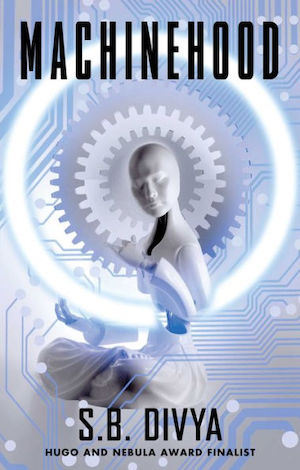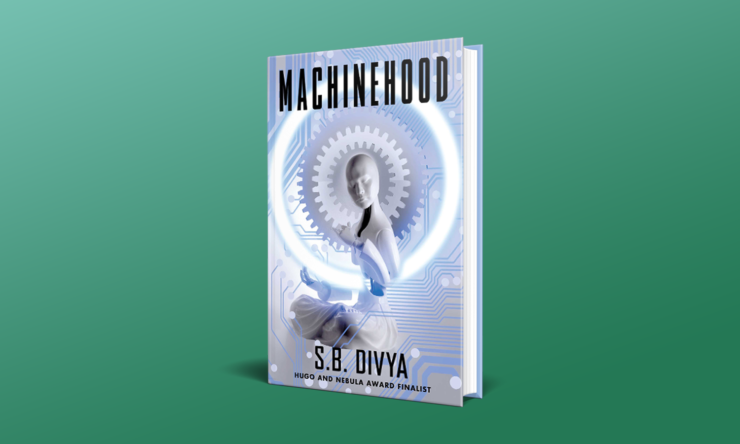S.B. Divya’s Machinehood brims with equally familiar and foreign concepts—predatory mega-corporations, and public performativity, and the fear of rogue AI are widespread parts of our present and so much of our near future; at the same time, Divya offers an earnest look at one person’s path to radical change, and perhaps the biggest fiction of all: humanity’s ability to accept the need for change. So much of its narrative journey hinges on its reader’s own biases around ambient Islamophobia and American exceptionalism, almost to the point where digesting the novel’s first few acts feels like taking in a bizarro Tom Clancy storyline.
In Divya’s future, the world relies on WAIs (weak artificial intelligence), public tip jars that function like existential Patreons, smart self-configuring material called “blox,” and a massive mass-produced pill industry to stay mentally and physiologically on par with robots. Everyone has a personal agent—a WAI implant that functions as a 24/7 networked concierge; Welga’s is named Por Qué, which she got when she was just seventeen. We’re introduced to protagonist Olga “Welga” Ramirez as a private security guard (or “shield”) with a decorated military past, but she’s more interested in good coffee, slow food, and carving out a stable existence with her partner, Connor. Naturally, this doesn’t last for long—it turns out that Welga has to save the world.
For the most part, Machinehood hums along at a brisk clip as it unfurls Welga’s action-packed journey from personal meatshield to iconic bridge between humankind and a mysterious terrorist-like protest group called The Machinehood. Divya’s portrayals of mass protest culture and “exfactors”—thrillseekers who want to boost both their profile and profits—land squarely on the nose. Descriptions of pill funders—high-powered pharma tycoons—lean on our own experiences of notorious startup bosses who cut corners and endangered lives. There are nods to how ageism—particularly on public platforms and streams±will become even more pronounced in the future, as Welga deals with her so-called advanced age of thirty-five.
Divya’s prose shines in intimate details and interior thoughts, in Welga’s hapless struggle against a mysterious motor-function disease, in private scenes where characters wrestle with complex personal choices. But perhaps due to the nature of Machinehood’s existential themes, concentrated bursts of expository dialogue and rhetorical questions, more often than not, end up clogging the narrative flow. There’s an anthropological bent to descriptions of modern military culture, body-modification practices, and the way humanity seems hellbent on ensuring its own destruction. There’s effort to discern tech-enhanced bodies from cyborgs—“a dirty word after the fifties”—that might have been better delivered with a lighter hand.
Buy the Book


Machinehood
Same goes for the passages that dwell on Welga’s devotion to her country. “Fending off bullies who came after her little brother—all of it paid off in the Marine Corps. She thought she’d found her calling by defending the weak, protecting her country and its allies. She hadn’t expected betrayal from above.” It’s the familiar, overused “soldier with a heart” trope that seems almost misplaced—with Machinehood’s wealth of future-focused ideas, it’s almost a shame that its protagonist is cut from the same two-dimensional cloth as an episode of Homeland, complete with an ominous, shadowy Islamic caliphate that we never meet.
But the most repeated bit of rhetoric is our obsession with duality—a fixture in the Machinehood’s manifesto, and repeated by the Neo-Buddhist monk Ao Tara toward the end of the novel. “For too long,” she says, “the world has embraced Western dualistic thought. Black or white. Right or wrong. Animal or machine. Living or dead. An enlightened future demands a radical change from that attitude.” Yet, the same breed of dualism remains stubbornly present throughout Machinehood, as perhaps Divya wants to draw our attention to the fact that we can never fully escape it in our current reality—a reality so wholly dependent on American foreign policy, Islamophobia, and the China/India superpower dynamic.
Still, while Machinehood holds a bold, noble message, within its chapters lies the shape of a deeper, more nuanced story, one that would shine brighter with a touch less rhetoric and exposition. As it stands, it’s best enjoyed as a high-tech romp through one woman’s quest for salvation, and her transformation (or evolution, depending on where you stand on bioethics) into something quite different.
Machinehood is available from Gallery / Saga Press.
Alexis Ong is a freelance culture journalist with weak ankles who mainly writes about games, tech, and pop culture. Her work has appeared in The Verge, Polygon, Kotaku, Rock Paper Shotgun, VICE, Dazed Digital, and more; soft spots include science fiction, internet archaeology, comics, boxing, and old games. You can find her at her website or on Twitter.










